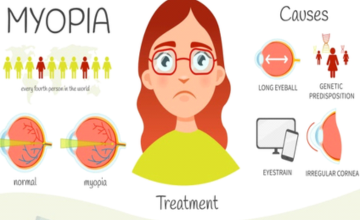- Email: info@swarupeye.com
- Hyderabad
- Call: +918886309030
Myopia Management
MYOPIA MANAGEMENT
"For many of us, the world is a blur without our trusty glasses or contacts. But what if there was a way to slow down the progression of nearsightedness (myopia), especially in children? At Swarup Eye Centre, we understand the growing concern of myopia and offer comprehensive myopia management services designed to protect your vision for the future."

What is Myopia
Myopia, commonly known as nearsightedness, is a very common refractive error of the eye. It's a condition where close objects appear clear, but distant objects appear blurry. This occurs when the shape of the eye causes light rays to focus in front of the retina, rather than directly on it.
This can be due to:
- The eyeball is too long.
- The cornea (the clear front surface of the eye) being too curved.
Causes & Risk factors
- Genetics: Myopia tends to run in families.
- Environmental factors:
- Increased time spent on close-up activities (reading, using electronic devices).
- Reduced time spent outdoors.
Signs and symptoms of myopia
- Blurry vision when looking at distant objects.
- Squinting.
- Headache
- Eyestrain.
- In children, frequent rubbing of the eyes, and sitting very close to screens.
Diagnosis:
At Swarup Eye Centre, we believe in a personalized approach to myopia management. Our experienced ophthalmologists and optometrists will conduct a thorough eye examination to:
- Measure your current refractive error and assess the rate of myopia progression.
- Evaluate your overall eye health.
- Cycloplegic Refraction: In some cases, cycloplegic eye drops like atropine are used to temporarily relax the eye's focusing muscles, allowing for a more accurate measurement of refractive error.
- Measuring child axial length and keratometer reading
- Discuss your lifestyle and risk factors.
Why is Myopia Management Important?
While myopia can often be corrected with glasses or contact lenses, managing its progression is crucial, especially in children, as the condition can worsen as they grow. Severe myopia increases the risk of serious eye problems later in life, such as:
- Retinal detachment
- Glaucoma
- Cataracts
- Macular degeneration
- Myopic maculopathy
Management:
- Myopia Control Glasses - Myopia control contact lenses are specifically designed to slow the elongation of the eyeball, the primary cause of worsening myopia. These lenses work by altering the way light enters the eye, helping to control the progression of myopia.
- Low-Dose Atropine Eye Drops: It is used nightly to slow the progression of myopia. It works by temporarily paralyzing the focusing muscle of the eye.
- Laser vision correction for adults
Prevention
- Spend time outdoors: Slowing the progression of myopia has also been associated with spending time outdoors— eye doctors recommend 60-80 minutes outside every day.
- Limit the amount of time you spend on your phone.
- Take frequent breaks from screen time— at least every hour.
- Place your screen 18-24 inches away from your face.
- Adjust screen brightness and contrast to make it more comfortable.
- Avoid screen use where a glare can affect vision.
- Blink frequently to keep your eyes moist.
For all near vision tasks such as reading, writing, texting, and computer use, follow the 20-20-20 rule— every 20 minutes, look 20 feet away, for 20 seconds.
Expert Consultation at Swarup Eye Centre:
At Swarup Eye Centre, our team of specialists is dedicated to providing comprehensive myopia management for patients of all ages, with a special focus on children and young adults. We take a proactive approach to myopia control, utilizing the latest research and treatment options to slow the progression of nearsightedness and reduce the risk of related eye conditions later in life.
Frequently Asked Questions
- At what age should myopia management begin?
Myopia management can begin as soon as myopia is detected, which can be as early as 5-6 years old. Early intervention is key to effectively slowing progression. - Can myopia be cured?
While myopia cannot be cured, its progression can be significantly slowed with proper management techniques, especially when started early. - How often should my child have eye exams if they have myopia?
Children with myopia should have eye exams every 6-12 months to monitor progression and adjust treatment as needed. - Are myopia management treatments covered by insurance?
Coverage varies by insurance plan. Our staff at Swarup Eye Centre can help you understand your coverage options for myopia management treatments.
